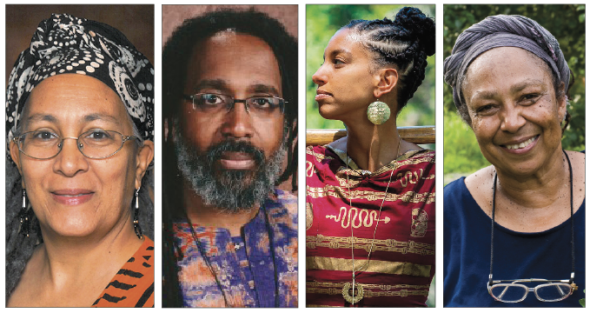
This year’s Black Farming Conference will feature, from left, Jessica Gordon-Nembhard, Ph.D., Malik Kenyatta Yakini, Leah Penniman and Ira Wallace. (Submitted photos)
Black Farming Conference set
- Published: September 9, 2021
The Agraria Center for Regenerative Practice — in partnership with Antioch College, Central State University and The National Afro-American Museum and Cultural Center — will present the Second Annual Black Farming Conference on Friday and Saturday, Sept. 10 and 11.
This year’s conference, which will be held online, will focus on the economic impacts and the power of the cooperative business model. Emphasis will be placed on the power of people growing their own food, from seed saving to community gardening, and celebrating the contributions of the Black and underrepresented food and farming community.
The schedule of keynote addresses is as follows:
Friday, Sept. 10, 7 p.m.: Jessica Gordon-Nembhard, Ph.D., professor of community justice and social economic development in the Department of Africana Studies at John Jay College, City University of New York. The author of “Collective Courage: A History of African American Cooperative Economic Thought and Practice” and 2016 inductee into the U.S. Cooperative Hall of Fame, Gordon-Nembhard is a political economist specializing in cooperative economics, community economic development and community-based asset building, solidarity economics, Black political economy and community-based approaches to justice.
Saturday, Sept. 11, 10–10:45 a.m.: Malik Kenyatta Yakini, co-founder and executive director of the Detroit Black Community Food Security Network, or DBCFSN. The network operates the seven-acre D-Town Farm and is spearheading the opening of the Detroit Food Commons in Detroit’s North End, which will house the Detroit People’s Food Co-op. Yakini views the work of DBCFSN as part of the larger movement for building power, self-determination and justice and is adamantly opposed to the systems of white supremacy, capitalism and patriarchy. Yakini has an intense interest in contributing to the development of an international food sovereignty movement that embraces Black communities in the Americas, the Caribbean and Africa. He is a co-founder of the National Black Food and Justice Alliance.
Saturday, Sept. 11, 11–11:45 a.m.: Leah Penniman, a Black Kreyol farmer, author, mother and food justice activist organizing for an anti-racist food system for 25 years. She currently serves as founding co-executive director of Soul Fire Farm in Grafton, N.Y., a Black- and Brown-led project that works toward food and land justice. She is the author of “Farming While Black: Soul Fire Farm’s Practical Guide to Liberation on the Land.”
Saturday, Sept. 11, 3–4 p.m.: Ira Wallace, a worker/owner of the cooperative Southern Exposure Seed Exchange, or SESE, seed company, which sources heirloom and other nonhybrid seeds, emphasizing those that grow well in the Mid-Atlantic region. SESE creates lectures and workshops and works with small seed-growing farmers in the U.S. to support seed saving and breeding. Wallace is also a member of Acorn Community Farm, described as “an anarchist, egalitarian community,” which farms over 60 acres of certified organic land in Central Virginia and is supported by seed sales from SESE.
In addition to the keynote addresses, the conference will include breakout sessions and moderated discussions with keynote speakers and local guests. Advanced registration is required.
For more information, or to register for the conference, visit BlackFarmingConference2021.eventbrite.com or CommunitySolution.org.
The Yellow Springs News encourages respectful discussion of this article.
You must login to post a comment.
Don't have a login? Register for a free YSNews.com account.











No comments yet for this article.